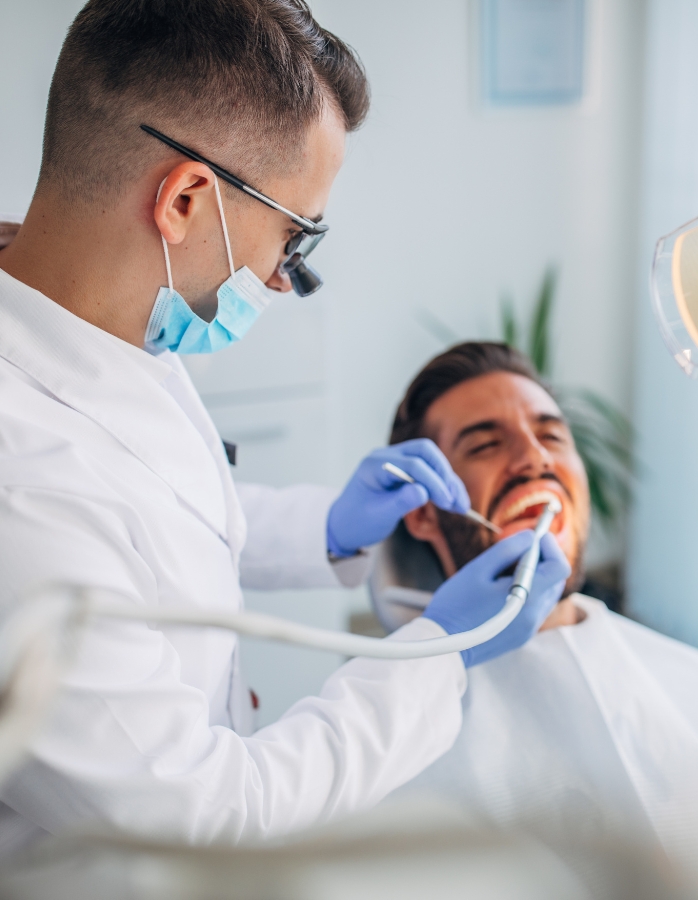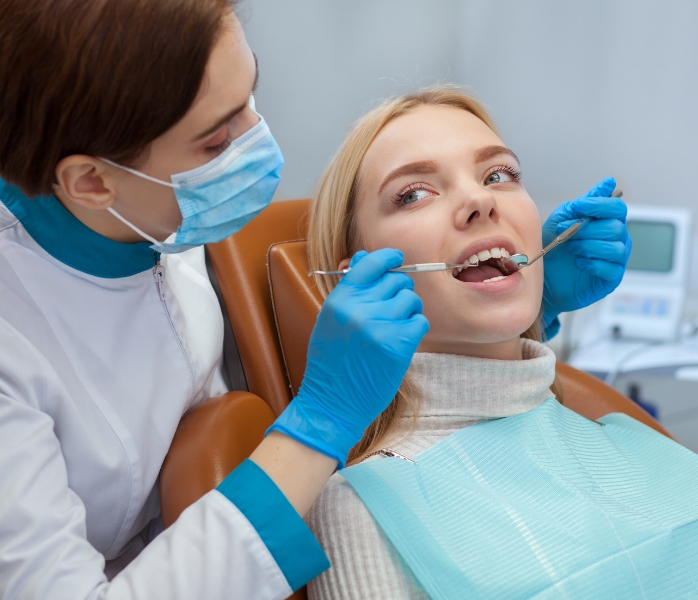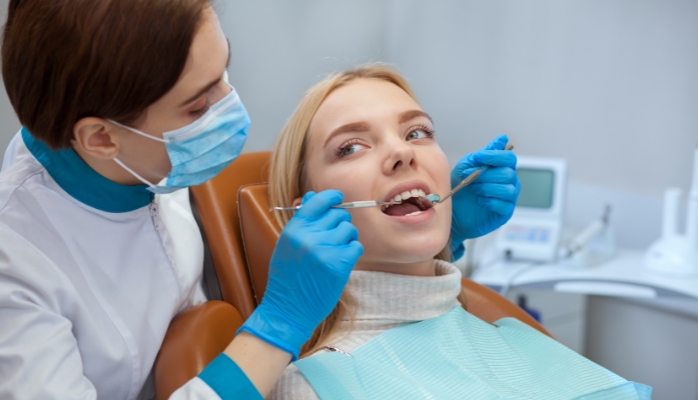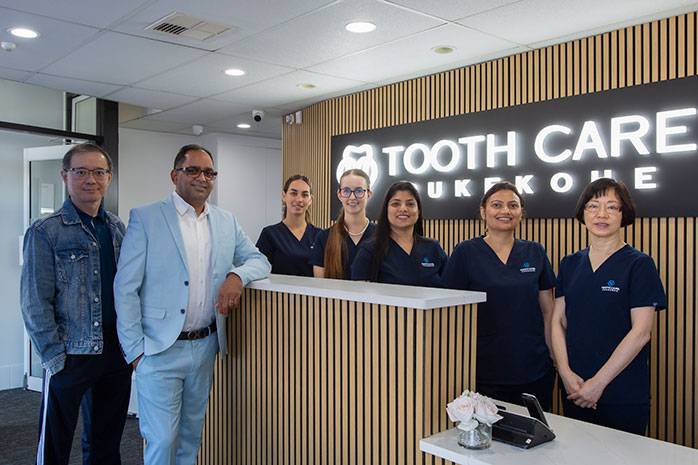Dental Hygiene Treatment
Dental Hygienist Pukekohe
Are your gums bleeding when you brush or floss? Do they appear red, swollen, or puffy? These may be early signs of gum disease. This condition is extremely common, if left untreated, it can lead to serious oral and overall health issues.
At Tooth Care Pukekohe, we believe that good oral hygiene is essential for achieving and maintaining a healthy, beautiful smile. Regular dental hygiene visits not only help prevent common dental issues like gum disease and cavities, but they also ensure your teeth and gums remain in optimal condition for years to come. Our team of expert dentists and dental hygienists is here to provide you with personalized care through professional cleaning and valuable oral hygiene advice.
Gum Disease: What You Need to Know
Gum disease is an infection of the gums caused by bacteria in plaque. If left untreated, it can lead to serious oral health problems. There are two main stages of gum disease:
- Gingivitis: Gingivitis is the early, reversible stage of gum disease. It causes gum inflammation, redness, and bleeding, especially when you brush or floss. At this stage, proper professional cleaning combined with improved home care can fully reverse the condition.
- Periodontitis: If gingivitis progresses untreated, it can develop into periodontitis. This more serious form of gum disease can lead to gum recession, pockets between the teeth and gums, and potential tooth loss. Periodontitis requires more intensive treatment, which may include deep cleaning procedures like scaling and root planning under local anaesthesia.
The good news is that gum disease is preventable with proper oral hygiene, regular dental visits, and a healthy lifestyle.


Gum Disease: What You Need to Know
Gum disease is an infection of the gums caused by bacteria in plaque. If left untreated, it can lead to serious oral health problems. There are two main stages of gum disease:
- Gingivitis: Gingivitis is the early, reversible stage of gum disease. It causes gum inflammation, redness, and bleeding, especially when you brush or floss. At this stage, proper professional cleaning combined with improved home care can fully reverse the condition.
- Periodontitis: If gingivitis progresses untreated, it can develop into periodontitis. This more serious form of gum disease can lead to gum recession, pockets between the teeth and gums, and potential tooth loss. Periodontitis requires more intensive treatment, which may include deep cleaning procedures like scaling and root planning under local anaesthesia.
The good news is that gum disease is preventable with proper oral hygiene, regular dental visits, and a healthy lifestyle.

What is Dental Hygiene Treatment?
Dental hygiene treatment involves a professional cleaning of your teeth and gums, as well as a thorough checkup to identify any potential issues. It’s crucial for maintaining your oral health, as it helps remove plaque (soft deposits), tartar (hard deposits), and harmful bacteria that could lead to gum disease, tooth decay, or other dental problems. Our goal is to support your home care efforts and provide you with the knowledge and tools to maintain your best oral health.
Our Dental Hygiene Services Include:
- Comprehensive Oral Examination: We look for signs of gum disease, cavities, or any other dental issues. This examination allows us to catch potential problems early and provide the appropriate treatment.
- Scaling: Scaling is the process of removing plaque and tartar buildup from your teeth, both above and below the gum line. This helps prevent the development of gum disease, including gingivitis and periodontitis.
- Deep Cleaning under Local Anaesthesia: In certain cases, a deep cleaning is essential to remove thick deposits of tartar (also known as calculus) that have built up below the gum line and in the spaces between your gums and teeth. Deep cleaning is performed under local anaesthesia to ensure a comfortable and pain-free experience while we thoroughly clean the affected areas. This treatment helps to restore gum health, prevent the progression of gum disease, and protect your teeth from further damage.
- Polishing: After scaling, we polish your teeth to remove any remaining surface stains, giving your smile a smooth, shiny finish. This step also makes it harder for plaque to accumulate on your teeth, helping you maintain your oral health in between visits.
- Fluoride Treatment: Depending on your specific needs, we may recommend a fluoride treatment at the end of your cleaning. Fluoride strengthens your tooth enamel and helps protect against cavities, particularly for patients who are at higher risk for tooth decay.
- Oral Hygiene Education: We offer one-on-one guidance to ensure you understand the best practices for home oral care. This includes personalized tips on brushing, flossing, and choosing the right oral care products. We’re here to support you in developing healthy habits that will benefit your smile for a lifetime.
How Often Should You have a Hygiene Appointment?
We recommend that most patients schedule a hygiene appointment every 6 to 12 months. However, if you are at higher risk for gum disease, cavities, or other oral health concerns, you may need more frequent visits. Our team will work with you to develop a personalized schedule based on your unique oral health needs.
The Importance of Regular Dental Hygiene
Routine hygiene appointments are crucial for preventing dental problems before they arise. Plaque and tartar (calculus) that build up over time can contribute to gum disease and tooth decay. Left untreated, these conditions can lead to painful symptoms, tooth loss, and the need for more extensive treatments. By attending regular hygiene appointments, you can:
- Prevent Gingivitis & Periodontitis: Regular cleanings help remove the plaque and tartar that contribute to these conditions.
- Protect Your Teeth from Cavities: By removing plaque and tartar buildup, we help you avoid cavities and the need for fillings.
- Maintain Fresh Breath: Bacteria that linger on the teeth and gums can cause bad breath. Regular cleaning helps keep your mouth fresh and odor-free.


How Often Should You have a Hygiene Appointment?
We recommend that most patients schedule a hygiene appointment every 6 to 12 months. However, if you are at higher risk for gum disease, cavities, or other oral health concerns, you may need more frequent visits. Our team will work with you to develop a personalized schedule based on your unique oral health needs.
The Importance of Regular Dental Hygiene
Routine hygiene appointments are crucial for preventing dental problems before they arise. Plaque and tartar (calculus) that build up over time can contribute to gum disease and tooth decay. Left untreated, these conditions can lead to painful symptoms, tooth loss, and the need for more extensive treatments. By attending regular hygiene appointments, you can:
- Prevent Gingivitis & Periodontitis: Regular cleanings help remove the plaque and tartar that contribute to these conditions.
- Protect Your Teeth from Cavities: By removing plaque and tartar buildup, we help you avoid cavities and the need for fillings.
- Maintain Fresh Breath: Bacteria that linger on the teeth and gums can cause bad breath. Regular cleaning helps keep your mouth fresh and odor-free.
Brushing and Flossing: The Foundation of Good Oral Hygiene
Brushing and flossing are the most effective ways to keep your teeth and gums healthy between dental visits. Here’s how to do it properly:

Brushing:
- Brush at least twice a day using a soft-bristled toothbrush and fluoride toothpaste.
- Hold your toothbrush at a 45-degree angle to your gums and use gentle, circular motions. Avoid scrubbing too hard, as this can damage your gums and tooth enamel.
- Be sure to brush all surfaces of your teeth, including the fronts, backs, and chewing surfaces. Don’t forget to brush your tongue to help remove bacteria and freshen your breath.

Flossing:
- Floss daily to remove plaque and food particles from between your teeth and below the gum line—areas your toothbrush can’t reach.
- Gently slide the floss between your teeth, curving it around each tooth in a “C” shape. Be careful not to snap the floss, as this can damage your gums.
- Consider using dental tools such as floss picks or water flossers if you have difficulty using traditional floss.

Why Choose Tooth Care Pukekohe?
- Expert Care: Our experienced team provides thorough, gentle care tailored to your needs.
- Comprehensive Services: From routine cleanings to gum disease treatments, we cover all aspects of oral health.
- Personalized Advice: We take the time to educate you on proper brushing, flossing, and other aspects of home care to keep your mouth healthy.
- Comfortable Experience: We focus on providing gentle, compassionate care to ensure you feel relaxed and comfortable during your visit.
Book Your Dental Hygiene Appointment Today!
Protect your oral health and keep your smile shining! Contact Tooth Care Pukekohe to schedule your next dental hygiene appointment. Our team is ready to help you achieve optimal oral health.